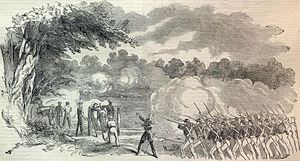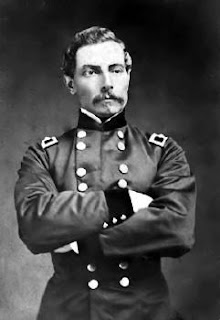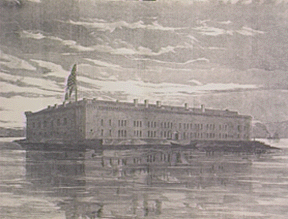 |
| Hatteras Expedition leaves Hampton Roads |
- Skirmishing breaks out at Wayne Court House, Blue's House, and Cross Lanes, western Virginia/1861
- From his throne in Hawaii, King Kamehameha IV proclaims the neutrality of the Hawaiian Islands in the War./1861
- In Western Virginia, Brigadier General John Floyd, commanding Confederate forces in the Kanawha Valley, crosses the Gauley River and attacks Col. Erastus Tyler's 7th Ohio Regiment encamped at Kessler's Cross Lanes. The Union forces are surprised and routed with 245 casualties. Confederate losses are 40. Floyd then withdraws to the river and takes up a defensive position at Carnifex Ferry./1861
- Hampton Roads, Virginia, is the scene of the disembarkation of the first Federal expeditionary fleet from Fortress Monroe. Its mission is to attack and capture Cape Hatteras, North Carolina, a haven for blockade runners. The amphibious force, composed of eight vessels and 900 New York troops, is commanded jointly by Flag Officer Silas Stringham and General Benjamin Butler. This joint Army-Navy operation has 500 men from the German-speaking 20th New York Volunteers, 220 from the 9th New York Volunteers, 100 from an Army unit calling themselves Union Coast Guard (actually the 99th New York Volunteers), and 20 army regulars from the 2nd U.S. Artillery on board the USS Adelaide and USS George Peabody. Stringham’s naval assault includes the USS Minnesota, Cumberland, Susquehanna, Wabash, Pawnee, Monticello, the US Revenue Service cutter Harriet Lane (used at Fort Sumter), and the tug Fanny, needed to tow some of the landing craft. Hatteras Inlet was the most important of the four inlets deep enough for ocean-going vessels, so North Carolina has constructed two forts there, named Fort Hatteras and Fort Clark. Fort Hatteras is on the sound side of Hatteras Island. Fort Clark is a half a mile southeast, nearer to the Atlantic Ocean, but neither are strong. Fort Hatteras has only ten mounted guns, with five more unmounted within the fort. Fort Clark has only five. Most of them are inadequate for coastal defense, only relatively light 32-pounders or smaller and of limited range. Worse is the scant numbers of soldiers. North Carolina raised and equipped 22 infantry regiments at the beginning of the war, but 16 of these are defending Virginia. The 6 regiments left are deployed to defend the entire North Carolina coastline. Only a few companies of the 7th North Carolina Volunteers occupy both forts at Hatteras Inlet. Other coastal forts are in similar weak shape. Less than 1,000 men garrison Forts Ocracoke, Hatteras, Clark, and Oregon, and reinforcements are as far away as Beaufort. Unbelievably, North Carolina militia authorities did not keep the sad state of their coastal defenses a secret and allowed captured and shipwrecked Yankee sea captains and others free access to the forts and their environs. At least two have provided valuable full descriptions to the US Navy Department./1861
- Union Captain A.H. Foote is ordered by the War Department in Washington to relieve Commander J. Rodgers in command of the Army’s gunboat flotilla on the Western rivers./1861
- The US tug Fanny under Lieutenant Crosby reports the capture of the blockade runner sloop Mary Emma at the headwaters of the Manokin River, Maryland./1861
- The USS Daylight under Commander Lockwood recaptures the brig Monticello in the Rappahannock River, Virginia./1861

































